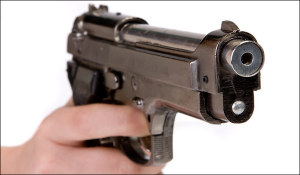If you are a gun owner with thoughts of protecting yourself and/or your family, getting a concealed carry permit is an important task for you. As a Jacksonville criminal defense lawyer and Florida gun rights lawyer, I can tell you that any situation where a gun is involved is one that is likely to be highly scrutinized and taken really seriously. This applies to situations where crimes are committed with guns, especially if there is a shooting. So why does this matter to people that lawfully own guns and use them for good? Well, even shooting your gun in self defense can lead to you being in hot water under some circumstances. Having a concealed carry permit will usually remove some of the questions from the minds of law enforcement when they conduct their investigation.
 Chapter 776 of Florida’s statutes is called Justifiable Use of Force. This collection of statutes gives guidance to when the use of force, including deadly force is okay. Shooting your gun in self defense will always be deadly force. Deadly force is described as force that is likely to cause great bodily injury or death. After all, the purpose of firing is to eliminate any threat that is present. If some properly, a firearm can help you to eliminate the threat against you and/or your family. Gun owners must be careful in this regard. You are only authorized by law to return the amount of force that is used against you. Shooting a guy during a fist fight at the park will surely land a person in prison. However, the law presumes that deadly force is appropriate in certain situations, for example when a stranger enters your home in the middle of the night without your permission. Chapter 776 of Florida statutes allows you to presume that the would-be burglar is there to cause you great bodily harm.
Chapter 776 of Florida’s statutes is called Justifiable Use of Force. This collection of statutes gives guidance to when the use of force, including deadly force is okay. Shooting your gun in self defense will always be deadly force. Deadly force is described as force that is likely to cause great bodily injury or death. After all, the purpose of firing is to eliminate any threat that is present. If some properly, a firearm can help you to eliminate the threat against you and/or your family. Gun owners must be careful in this regard. You are only authorized by law to return the amount of force that is used against you. Shooting a guy during a fist fight at the park will surely land a person in prison. However, the law presumes that deadly force is appropriate in certain situations, for example when a stranger enters your home in the middle of the night without your permission. Chapter 776 of Florida statutes allows you to presume that the would-be burglar is there to cause you great bodily harm.
Calling a gun rights lawyer should be the next call made after shooting your gun. You should speak with an attorney prior to providing a statement to police. In my experience, this annoys law enforcement a little, but I believe it’s worth protecting your future. At the Law Office of David M. Goldman, PLLC, we have the necessary experience and knowledge to help in these situations. Call us today at (904) 685-1200 to find out more about your rights and about what should be done in the event of a discharge.
 Jacksonville Criminal Defense Lawyer Blog
Jacksonville Criminal Defense Lawyer Blog

